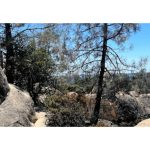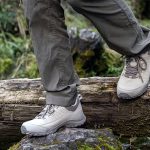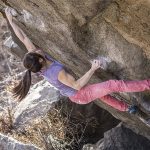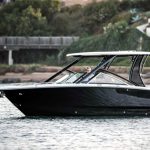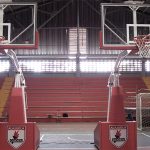The International Mountain Bicycling Association (IMBA) and the National Park Service (NPS) announced 12 partnership projects for 2006, including three pilot programs. In May, 2005 the two organizations signed a partnership agreement to bring mountain bikers and park officials together for on-the-ground teamwork and to develop models for future collaboration.
The programs outlined below three pilot projects and nine Subaru/IMBA
Trail Care Crew trail visits are the first tangible results of the
partnership.
Three Pilot Programs Unveiled
The pilot mountain bike programs will be carried out in Big Bend National
Park (Texas), Fort Dupont National Park (Washington, DC) and Cuyahoga Valley
National Park (Ohio). Each of the three programs is unique, but all will
involve substantial study of the recreational benefits and potential impacts
that mountain biking can bring to national park units.
Big Bend National Park (Texas): John King, Big Bend's superintendent, says
his park is close to initiating an Environmental Assessment study, a
necessary first step toward creating opportunities for singletrack riding in
the 801,000-acre park. “I expect that we'll be able to start the study in a
matter of weeks,” says King. “First, we'll find out if mountain biking is
appropriate for Big Bend. If the results of the study are favorable, we'll
move forward with a rule-making procedure that would open the way for
mountain biking in non-Wilderness areas.”
Jeff Renfrow, a local mountain bike advocate with the Big Bend Trails
Alliance, is excited about the prospect of working with park staff and IMBA.
“We are especially honored to be a part of a process that we hope will lead
to the creation of additional mountain biking opportunities in the national
park system,” says Renfrow.
Fort Dupont National Park (Washington, DC): Fort Dupont provides a unique
opportunity for singletrack mountain bicycling inside the Beltway with eight
miles of existing trails open to biking. However, the trails are in need of
repair to make them more environmentally sound. “National Capital Parks-East
is very excited about the opportunity to work with IMBA and its local
affiliate, the Mid-Atlantic Off-Road Enthusiasts,” says Superintendent Gayle
Hazelwood. “The assessment of the hiking and biking trails within the Fort
Circle Parks will greatly assist our park with the goals of improving both
trail sustainability and visitor access and enjoyment of the trail system.”
Dan Hudson, for Mid-Atlantic Off-Road Enthusiasts (MORE), added: “The Fort
Circle Trail is a great resource for trail users on the east side of town.
There are segments where erosion has become a concern. MORE is excited to
help repair and protect this valuable resource.”
Cuyahoga Valley National Park (Ohio): “We are keenly interested in examining
mountain bicycling as a possible component of our next trail management plan
revision,” says Bill Carroll, deputy superintendent at Cuyahoga.
While the timetable for establishing a pilot mountain bicycling program in
Cuyahoga is still in development, local bike advocates are hopeful that
preliminary studies will be approved. “The park is only 15 minutes from
downtown Cleveland, and is no more than an hour and a half from more than 4
million residents of northeast Ohio. This has the potential to produce one
of the best trail systems in Ohio and a destination for the entire region,”
says Mike Farley, of the IMBA-affiliated Cleveland Area Mountain Bicycling
Association.
Nine Subaru/IMBA Trail Care Crew Visits Proposed
In addition to the three pilot programs, the Subaru/IMBA Trail Care Crews
hope to visit as many as nine National Park units in 2006. The Trail Care
Crews will provide expert advice on trail etiquette and rider education,
managing mountain bikes, trailbuilding and trail repair. The Crews will
work with local mountain bike clubs, other trail user groups, community
leaders and park staff to foster communication and collaboration. Visits
have been proposed for these parks:
* Big South Fork National Recreation Area (Tennessee)
* Mississippi National River and Recreation Area (Minnesota)
* Saguaro National Park (Arizona)
* Chattahoochee National Recreation Area, Cochran Shoals Unit (Georgia)
* Homestead National Monument of America (Nebraska)
* Chickamauga and Chattanooga National Military Park (Tennessee)
* Whiskeytown National Recreation Area (California)
* Mammoth Caves National Park (Kentucky)
* Hawaii Volcanoes National Park (Hawaii)
“According to a recent survey, a majority of Americans want to see more
opportunities for active recreation in national parks, including bicycling,”
says IMBA Executive Director Mike Van Abel. “IMBA couldn't be more excited
to help the National Park Service with developing appropriate bike
opportunities at a dozen parks next year.”
40 National Parks Units Already Offer Mountain Bike Access
More than 40 NPS units already provide mountain bikers with the opportunity
to explore their parks on dirt roads and trails. Visit
mountain biking and additional information on IMBA's partnership with the
NPS.
Bringing mountain bicycling to national park units that do not already have
bicycle access will not happen overnight. New riding opportunities
(including the IMBA/NPS pilot programs) require detailed study by park
officials, as well as special rule-making procedures for each park. Also,
land that is protected as Wilderness, as well as proposed Wilderness, will
not be considered for these mountain bicycling programs.



